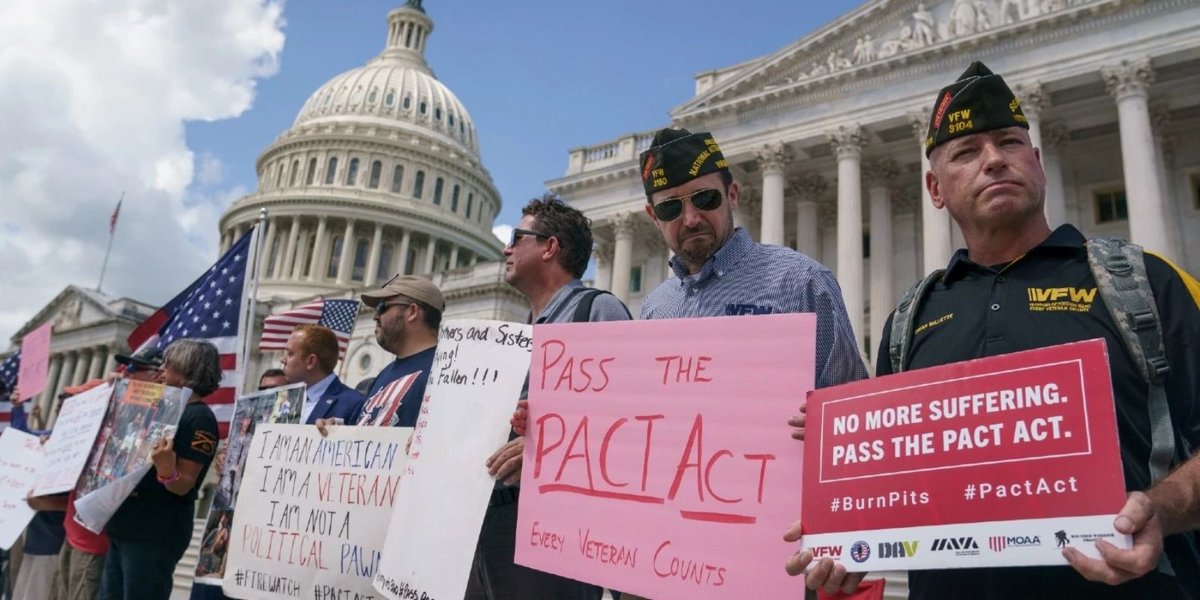What Is the Pact Act?
So, what exactly is the PACT Act? The PACT Act is a contemporary law that lengthens health care and VA benefits to Veterans exposed to burn pits, which emit toxic substances after burning chemicals, human waste, plastics, etc. What makes the bill so unique is that the VA automatically assumes or "presumes" your condition is service-related for some conditions. These conditions are called "presumptive conditions." Therefore, if you have a presumptive condition, you're not required to prove your time in the service caused your condition. All you have to do is meet the service requirements for the presumption. Presumptive conditions will help Veterans who struggle to prove their illness is service-related get the additional benefits they need. The PACT Act is one of the most extensive health care/benefit expansion efforts by the U.S. Department of Veterans Affairs. It will provide generations of Veterans with access to additional benefits due to their presumptive conditions. According to the U.S. Department of Veterans Affairs, the PACT Act will impact VA care in the following ways:- "Expands and extends eligibility for VA health care for Veterans with toxic exposures and Veterans of the Vietnam, Gulf War, and post-9/11 eras.
- Adds more than 20 new presumptive conditions for burn pits and other toxic exposures.
- Adds more presumptive-exposure locations for Agent Orange and radiation.
- Requires VA to provide a toxic exposure screening to every Veteran enrolled in VA health care.
- Helps us improve research, staff education, and treatment related to toxic exposure."
Burn Pit Exposure
For military members, burn pits may be nothing out of the ordinary. They’re areas devoted to open-air combustion of trash. These areas are burn pits, a common waste disposal practice on military sites overseas, such as in Iraq and Afghanistan. Fumes from these burn pits contain substances that can potentially cause short-term and long-term health effects for our Veterans and active-duty military members. Those exposed for long periods and individuals with pre-existing conditions are prone to illness. So, how do you know if you have a presumptive condition caused by burn pits? Well, according to the U.S. Department of Veterans Affairs, if you served in any of these locations and time periods, you have a presumption of exposure: “On or after September 11, 2001, in any of these locations:- Afghanistan.
- Djibouti.
- Egypt.
- Jordan.
- Lebanon.
- Syria.
- Uzbekistan.
- Yemen.
- The airspace above any of these locations.
- Bahrain.
- Iraq.
- Kuwait.
- Oman.
- Qatar.
- Saudi Arabia.
- Somalia.
- The United Arab Emirates (UAE).
- The airspace above any of these locations.”
Advertisement
Military Base Toxic Exposure Veterans Disability Benefits
 If you’ve ever asked yourself, "How do I know if my illness is a presumptive condition?" We have answers. The VA added over twenty presumptive conditions for burn pits and toxic exposure as a result of the PACT Act. The following conditions are now listed as presumptive in the bill:
Presumptive cancers:
If you’ve ever asked yourself, "How do I know if my illness is a presumptive condition?" We have answers. The VA added over twenty presumptive conditions for burn pits and toxic exposure as a result of the PACT Act. The following conditions are now listed as presumptive in the bill:
Presumptive cancers:
- Melanoma.
- Brain cancer.
- Neck cancer.
- Glioblastoma.
- Kidney cancer.
- Pancreatic cancer.
- Lymphoma of any type.
- Head cancer of any type.
- Lymphatic cancer of any type.
- Reproductive cancer of any type.
- Gastrointestinal cancer of any type.
- Respiratory (breathing-related) cancer of any type.
- Pleuritis.
- Sarcoidosis.
- Emphysema.
- Chronic rhinitis.
- Chronic sinusitis.
- Chronic bronchitis.
- Pulmonary fibrosis.
- Granulomatous disease.
- Interstitial lung disease (ILD).
- Asthma that was diagnosed after service.
- Chronic obstructive pulmonary disease (COPD).
- Constrictive bronchiolitis or obliterative bronchiolitis.
Burn Pit Registry VA
 Since 2014, the VA has established the Airborne Hazards and Open Burn Pit Registry to gather a secure database of health information voluntarily provided by service members and Veterans. The VA can get a better understanding of long-term health conditions resulting from burn pits and toxic exposure when more people join the registry.
Although participation is voluntary, and you don't necessarily need to have any health conditions, your participation will help the VA track and monitor toxic exposure.
To find more information on the Airborne Hazards and Open Burn Pit Registry and the PACT Act, visit the VA website.
Read next: The Dangers of Exposure to Burn Pits & New Policies To Mitigate Them
Since 2014, the VA has established the Airborne Hazards and Open Burn Pit Registry to gather a secure database of health information voluntarily provided by service members and Veterans. The VA can get a better understanding of long-term health conditions resulting from burn pits and toxic exposure when more people join the registry.
Although participation is voluntary, and you don't necessarily need to have any health conditions, your participation will help the VA track and monitor toxic exposure.
To find more information on the Airborne Hazards and Open Burn Pit Registry and the PACT Act, visit the VA website.
Read next: The Dangers of Exposure to Burn Pits & New Policies To Mitigate Them
Image: The Hill | AP | J Scott Applewhite




